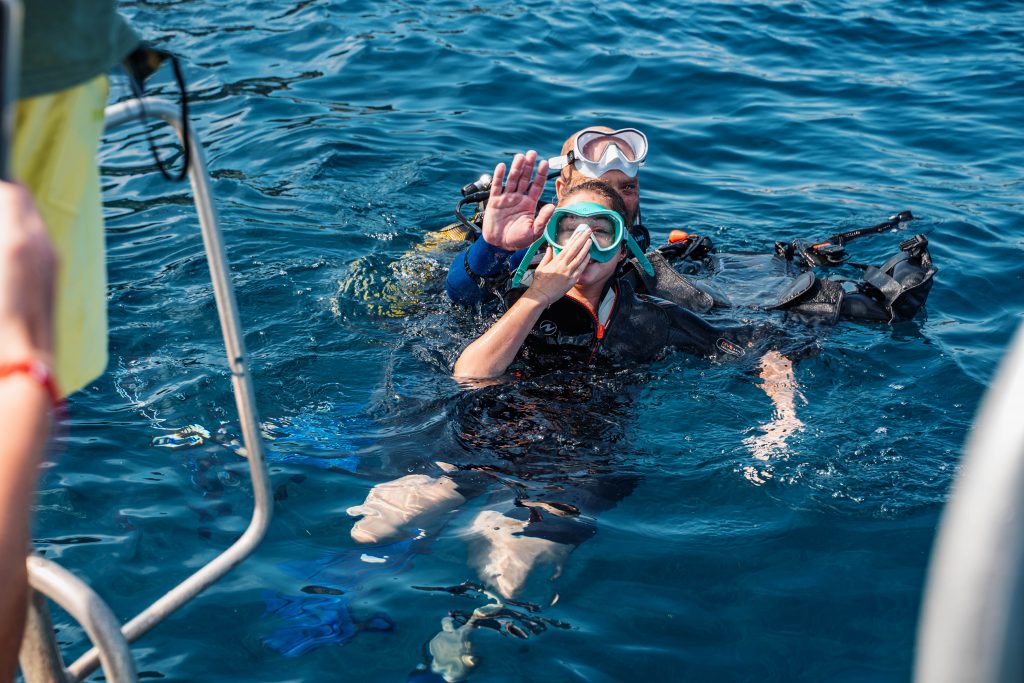Did you know that sea air can literally put you in a good mood? “The sound and the sight of the ocean puts us is a good mood” explains Dr Arghya Sarkel, consultant psychiatrist.
“The touch of sand and the smell of sea air relaxes us. From a biological point of view, this audiovisual stimulus triggers our parasympathetic nervous system, that activates rest and digestion, as opposed to fight or flight”, she adds. Today, scientists measure the mental and physical positives of water and improvement of physical health and well-being.
Wallace J. Nichols, a marine biologist has conducted thorough research into the unique capacity of the ocean to induce a state that he calls “Blue Mind” in humans. Blue Mind is a slightly meditational state including calm, peacefulness, unity and a feeling of general happiness and satisfaction in life in the present moment. Nichols affirms that our brains are wired to react positively to water, and being close to water can calm us down, connect us, improving innovation and perceptiveness, healing us at a deep level.
Jeffery Puncher, Director of the Medicine Faculty of Ottowa University is also interested in the therapeutic benefits of diving. He has developed a virtual reality diving programme to help his patients relieve their stress and anxiety thanks to relaxing scenes of coral reef and agitated seas, accompanied by the soothing sound and bubbles under the surface. This programme is used by medical students, interns and professors, with the goal of developing and adopting it on a national scale, contributing to the psychological health of the first patients.
In 2018 PADI launched a training course of adaptive techniques that teach how to modify equipment configurations and develop the competences of a diver according to their needs, ensuring that, whatever the physical or mental handicap, everyone can find healing underwater. Multiple scientific studies have been conducted in the last decade to quantity and prove the incredible benefits of scuba diving for people suffering from mental and/or physical handicaps.
All over the world, PADI professionals and dive centres use adaptive techniques and the natural remedy of the ocean to help heal people in their local communities. Here are some examples of the great programmes that are available:

Patriots Scuba – Virginia, United States
Patriot Scuba offer a solid programme of adapted scuba diving training courses that specifically targets helping injured military veterans. The programme, based in Virginia operates since 2013 as a not for profit called Patriots for Disabled Divers. They have trained hundreds of adaptive divers who have suffered traumatic brain injuries or amputations. These veterans not only benefit from the psychological healing that diving brings, but also an activity that provides a feeling of adventure and meaning.
Scuba Diving for All – Ripon, United Kingdom
Scuba Diving for All is charitable organisation registered in Ripon for 17 years. They offer scuba diving courses to people with particular needs. The founders Yvonne and Archie Covell wish to make scuba diving more accessible in their region and offer their students the freedom of movement and the feeling of being free from gravity. The programme was recognised by the Queen’s Award for Voluntary Service and numerous students have obtained the PADI Open Water Diver certification.
Eco Dive – Grenada, Caribbean
Eco Dive organised a training session for static free diving for Natasha and Rachel Lambert known as the “Sailing Sisters”. Natasha is a handicapped international sailor who shows that people of all capacities can explore and protect the ocean. Eco Dive concluded the training session with the sisters doing a beach clean-up, also showing that everyone can change the ocean, explore and protect our blue planet.
Syed Abd Rahman and Ernest Teo – Malaysia
Syed Abd Rahman, PADI IDC Staff Instructor and Ernest Teo PADI Master Scuba Diver Trainer have engaged themselves in teaching diving to young handicapped people for nearly 30 years. They manage Diveheart, a charitable organisation whose objective is to give handicapped people confidence via diving and adapted therapy, training health professionals and physiotherapists to reeducation so they can help their patients heal in the water.
Surf Therapy – California and Australia
Carly Rogers, a lifeguard from Los Angeles and student with a diploma from the University of South California has started to put in place an ocean therapy group, teaching soldiers to surf, followed by a group discussion. Since the beginning over 1,000 soldiers have been treated via the ocean therapy programme. In 2014 Rogers contributed a study of the programme published in the American Journal of Occupational Therapy. Of the 11 war veterans who participated in the study, all reduced their symptoms of post-traumatic stress disorder and depression.
In Australia, Ocean Heroes, in the west of the country, used therapy via surfing to help people suffering from autism. In the State of Victoria, Ocean Mind offers therapy via surfing to young people suffering from mental health problems, isolation and handicaps. Finally, Waves of Wellness in New South Wales also offers surfing related therapy to people suffering from mental health problems.
Carsten Schultz – Aalborg Dykkerskole, Norway
Carsten Schultz gave himself a mission to help people who have lost their sight grow their sensations and their other senses and regain confidence in themselves by teaching them to dive. In the context of his programme for handicapped people with Diving 360, he has officially certified people suffering from visual deficiencies, amputations and multiple sclerosis as PADI Open Water Divers.




